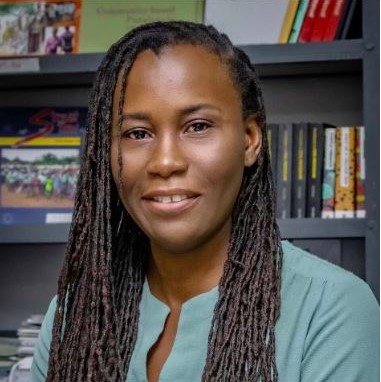NULAI Program Director Odi Lagi on the use of mobile courts and the impact of COVID-19 on pretrial detention
May 25, 2020

This interview is part of a longer article. Read the full post “Justice in the time of COVID-19: Innovations to preserve rule of law, rights & safety in Nigeria” here.
Q: How do the mobile courts work?
A: The mobile courts only prosecute offenders of the Quarantine Act and are manned by up to two Magistrates. The accused are brought by the police to the court, not sent to jail/lock up. The courts themselves are dismantled daily, and do not sit in a particular location, but are permitted to move within their jurisdiction. Magistrates only issue non-custodial sentences such as fines ranging from 1,000- 3,000 Naira; community service such as sweeping roads and picking up litter, impounding of cars and motorcycles, even detention under trees located close to the courts. Court proceedings are attended by police, the Nigeria Security and Civil Defense Corps, the Federal Road Safety Corps, and Abuja Environmental Protection Board. All of these agencies are members of Nigeria’s COVID 19 Task Force.
Q: How does NULAI’s partnership with the Nigerian Bar Association in Abuja work? What was the motivation behind this partnership?
A: NULAI formed this partnership in an attempt to prevent additional remands to the Nigeria Correctional Service, which would only increase pretrial detention in Keffi and Kuje Custodial Centers where the Reforming Pre-Trial Detention in Nigeria project is being implemented. The partnership provides legal representation in Abuja, at the mobile courts through a team of volunteer lawyers sourced from the Nigerian Bar Association, while NULAI monitors court proceedings.
The lawyers are assigned to the 13 mobile courts across Abuja and the surrounding suburbs. In some courts, presiding Magistrates have requested the pro bono lawyers to defend all accusers, while other Magistrates permitted legal representation to those who expressly stated they required these services. All defendants are asked if they would like to represent themselves. At the beginning of May, a total of 2,986 people had been prosecuted by mobile courts in Abuja.
Q: The Nigeria Corrections Service Act was enacted last year to establish non-custodial sentencing, among other things. How has this type of sentencing worked practically in the COVID-19 context? What has the response by the Nigeria Correctional Service been to mitigate the spread of coronavirus in the corrections system?
A: Nigeria Correctional Service is mandated by law to supervise non-custodial sentencing. However, in the case of the mobile courts the task force team supervises these sentences. This measure was put in place to mitigate the spread of COVID-19 within the correctional system. However, it is not clear how well this will work because, for instance, defendants required to sweep the roads as part of their sentencing are not provided soap or water to wash their hands before they use brooms to sweep streets. They all use the same broom! It is conceivable, the lack of proper hygiene will likely cause additional COVID-19 cases.
To date there has been no case of COVID-19 recorded by the Nigeria Correctional Service; however, one should keep in mind that there is no testing, and personal protective equipment is scarce within the correctional system. The Nigeria Correctional Service has banned external access to its facilities to reduce potential transmission of COVID.
Q: How could Nigeria better prepare for future pandemics or global crises and, in particular, prepare courts to ensure they remain functional?
A: Our courts have been closed since March, with the exception of extenuating time sensitive matters. This has further prolonged pretrial detention not just at Keffi and Kuje Custodial Center but across Nigeria’s 36 states. The coronavirus has underscored the need to integrate technology and digital processes in court proceedings. This step, in tandem with other reforms, would ease and speed up judicial processes. If the Nigeria Correctional Service Information Management System were deployed across all correctional and custodial centers, if the judiciary, Directorate of Public Prosecution, and police had effective information management systems, then it is likely pretrial detainees would have been able to have their cases heard. Going forward, the courts should pursue non-custodial alternatives vigorously. This will help check or reduce pretrial detention, which would only help the Correctional Service to better manage future spread of disease throughout the correctional system.
About NULAI
The Network of University Legal Aid Institutions (NULAI) Nigeria was established on 16th October 2003. It is registered with the Corporate Affairs Commission Nigeria as NULAI Nigeria (Limited by Guarantee – RC650698), a non-governmental, non-profit and non-political organization committed to promoting clinical legal education, legal education reform, legal aid and access to justice.
